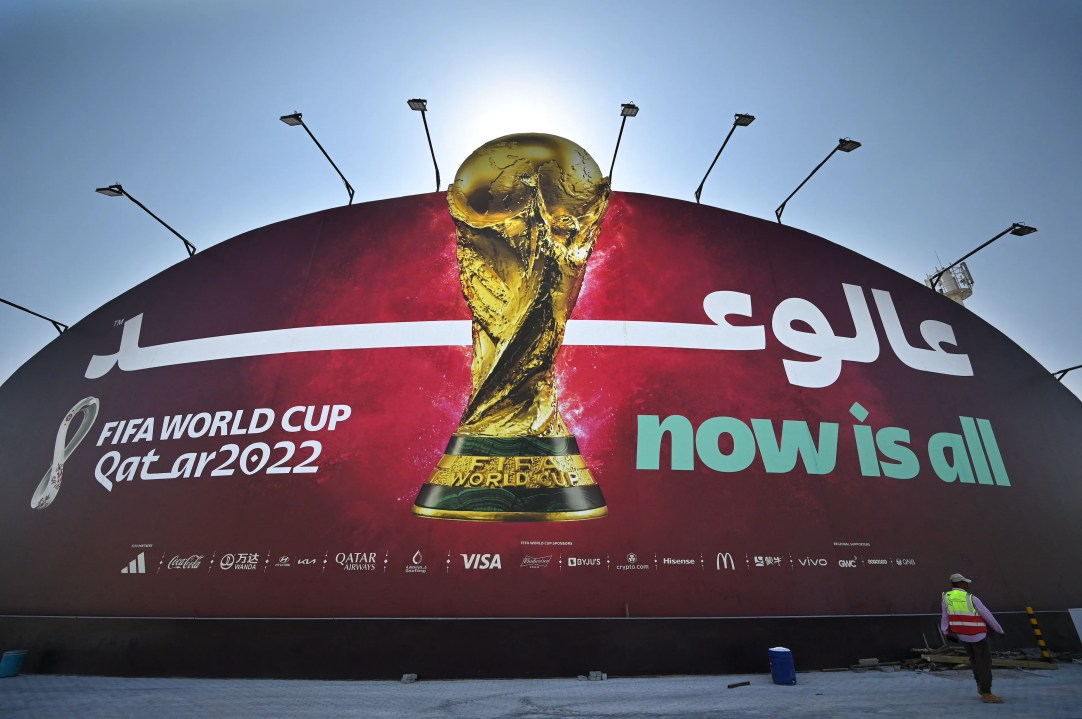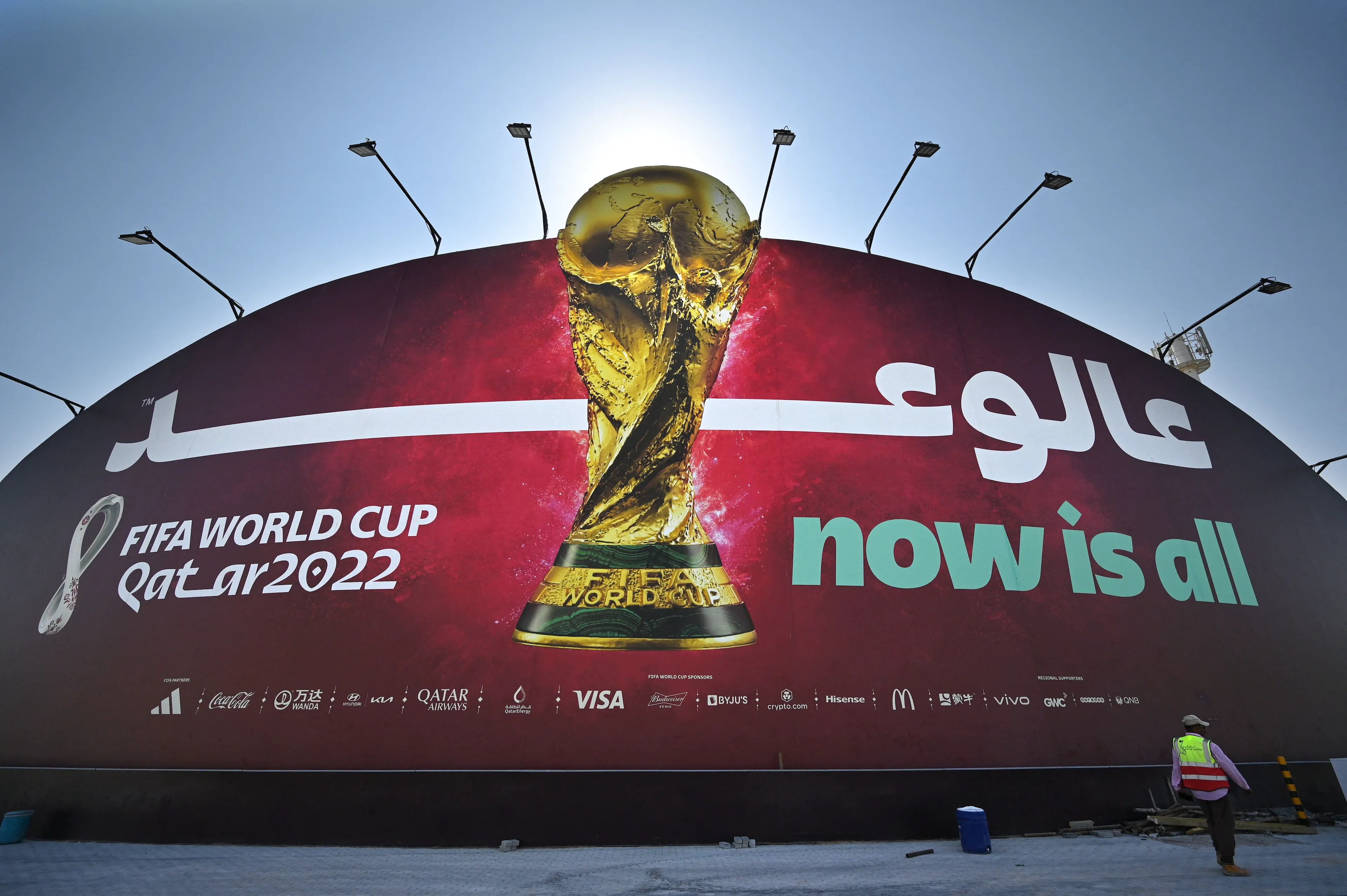If you go to Fifa’s website, you’ll find all sorts of things to make your heart sing and tears spring unbidden to your eyes. It’s not just about football, you see, and the making of obscene amounts of money from it. It’s about values. It’s about making football a beacon of good in this wicked world. There are pages of material about how ‘Fifa has been able to use the global popularity of football to spread positive social messages to wider society’.
If you took all this at face value you’d have the impression that football is the means, rather than the end – as if the enrichment of Fifa’s high-ups, the commercial partnerships and the rapacious brand-policing were all just side-effects of its mission to make the world a better place. You’d think, from the way it talks, that Fifa was an NGO or a wearisomely do-gooding department of the United Nations rather than a profit-making private company.
But with the approaching World Cup in Qatar, this material has made the magical transformation from emetic corporate boilerplate into god-tier chutzpah. I’m reminded of the old story of the poacher emerging from the woods, covered in blood, with the corpse of a gralloched stag over his shoulder, and running smack into a gamekeeper. ‘What are you doing?’ asks the gamekeeper. ‘Out for a stroll,’ he says. ‘What’s that on your shoulder, then?’ Poacher looks at the shoulder that doesn’t have the stag on it: ‘Nothing.’ ‘The other shoulder.’ Poacher looks at other shoulder, makes face of fright and astonishment: ‘Eeeeww!’ he exclaims, and starts brushing at the corpse with the back of his hand as you might at a speck of dust.
It’s not too late for musicians, sponsors and even – above all – football players to say: stuff Qatar, and stuff Fifa’s way of doing business
What possible reason could there have been in the first place for awarding the football World Cup to a country with no footballing tradition to speak of, no footballing infrastructure, facilities that had to be slave-built (sorry, ‘migrant-worker’ built) from the ground up, and a climate so hot that having the competition at the normal time of year would have likely risked the players’ deaths from heat exhaustion (not to mention restrictive instincts with regard to the alcohol that forms an important part of the enjoyment of the game for many football fans)? What could possibly have tipped the balance? Could millions and millions of pounds in bribes have had anything to do with it? Fifa denies it hotly, and I suppose we are honour-bound to believe them.
The rationale, we must assume, was the same one that has allowed any number of organisations to justify doing profitable deals with governments whose human rights records are grotesque: ‘constructive engagement’. The World Cup didn’t go to Qatar in spite of its record of unfree labour, institutional misogyny, repression of free speech and criminalisation of homosexuality: it went to Qatar because of it. The idea is that by swinging the eyes of the world onto a repressive regime, you encourage the better angels of its nature to spring forth.
So how’s that working out, as the World Cup approaches? Answer: not so well. After an international outcry over the deaths of hundreds of migrant workers, some noises were made by the government back in 2014 about reforming the labour laws – which on the face of it seemed to be an instance of just what constructive engagement can achieve. But eight years on Amnesty reports: ‘Despite its stated commitment, the government failed to implement and enforce reforms, enabling abusive practices to resurface and reviving the worst elements of kafala (the sponsorship-based employment system).’
Amnesty adds, moreover, that ‘curtailment of freedom of expression’ has increased in the run-up to the competition. Peter Tatchell had to fold a poster up inside a newspaper to smuggle it into the country before staging what he claims was the first gay rights protest ever to have taken place in a gulf state. It was just him and his poster, bless his heart, and it didn’t take all that long for the Qatari bizzies to descend on him and make clear that leaving the country was a good idea. I daresay had Mr Tatchell been a Qatari citizen with a smaller western media profile, they’d have made their point more forcefully.
Journalists who tried to report on the conditions in which the slaves – sorry, ‘migrant workers’ – who built the stadiums were living were placed under arrest. Only last week it was reported that thousands of those migrant workers were forcibly evicted with as little as two hours’ notice from apartment buildings in the areas of Doha expected to play host to visiting fans. Nothing to do with the World Cup apparently, just some, um, municipal reorganisation. Nothing to see here. Fifa didn’t have anything to say to reporters on the subject.
The school of thought that says we should keep politics out of sport pays no attention either to sport or to politics. Sport is about as political as it gets. International competition at the top level is organised by nation-state. Flags and national anthems feature, we’ll all have noticed, prominently. The question of who gets to host big sporting competitions is as political as hell – to host an international tournament is a great boost to trade and a great launderer of national reputations. It has been plausibly suggested that Russia’s invasion of Ukraine was purposely delayed because Xi Jinping asked Vladimir Putin to hold off on killing Ukrainians till the end of the Winter Olympics lest it eclipse all those favourable headlines and, so to speak, harsh the buzz of all those spectators enjoying the downhill slalom. There’s a reason the little guy with the moustache was so very, very pleased to have the Olympics in Berlin all those years ago.
Finding it repellant, then, that the Qatari regime should host the World Cup isn’t partisan liberal handwringing: it’s basic decency. And the ‘realist’ argument that it’s just the way the world wags, and we should hold our noses and enjoy the football, is a counsel of despair. It’s baffling to me that musicians such as Fatboy Slim and Robbie Williams, both vocal supporters of gay rights, will be playing in Qatar around the time of the World Cup. It’s baffling to me, too, that we’re pretending that the odd discreet rainbow armband on a player or rainbow flag in the stadium will be regarded as ‘constructive engagement’ in this obscenity.
Fifa has demonstrated beyond any doubt that it is interested in making money and only making money. But Fifa doesn’t have the monopoly on ‘constructive engagement’. It’s not too late for musicians, sponsors and even – above all – football players to say: stuff Qatar, and stuff Fifa’s way of doing business. That really would be using ‘the global popularity of football to spread positive social messages to wider society’.







Comments